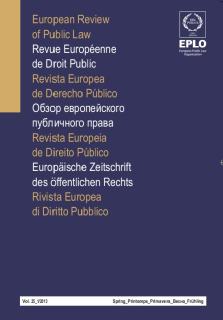
PUBLIC LAW AND THE ECONOMIC CRISIS
BULGARIA
RUMEN STEFANOV
Professor at the Department of Political Sciences, New Bulgarian University
Bulgarian government institutions are actively involved in the regulation process in order to minimize the economic crisis' negative effects. The measures taken vary, trying to embrace all elements of the societal functioning, starting from rigorous budgetary discipline imposition to the combat against "shadow economy" and illegal smuggling of goods. As tools for regulation improvement are also used with success amendments to the national legislation. Due to the strict financial policy and state control on the credit institutions, the banking system is considered from the foreign partners and rating agencies as stable. Although a lot of initiatives are under way and new approaches are applied, the recovery is still very slow. Significant insufficiencies still exist in the activities of the judicial, healthcare and pension systems. Unnecessary bureaucracy in certain administrative procedures still remains. This concerns also the EU funds allotment. Bulgaria complies with the requirements imposed by EU institutions, despite the negative impact some of them have on the national welfare. The politicians are in favor of supporting any initiative from Brussels considered necessary to help the EU countries to go out of the crisis, provided it is adopted in a democratic way and takes into consideration the interests of each Member State.
Les institutions gouvernementales bulgares sont activement impliquées dans le processus de réglementation visant à minimiser les effets négatifs de la crise économique. Les mesures prises varient et essaient d'englober tous les aspects du fonctionnement de la société, allant de l'imposition d'une discipline budgétaire rigoureuse à la lutte contre "l'économie de l'ombre" et la contrebande de marchandises. Les modifications de la légi-slation nationale sont aussi des instruments utiles à l'amélioration de la réglementation. Grâce à la politique financière stricte et au contrôle de l'Etat sur les établissements de crédit, le système bancaire est considéré comme stable par les partenaires étrangers et les agences de notation. Malgré le lancement d'un grand nombre d'initiatives et la mise en œuvre d'approches nouvelles, la reprise se fait attendre. Des insuffisances importantes persistent dans les activités des systèmes judiciaire, de santé et des retraites. Une bureaucratie inutile perdure dans certaines procédures administratives. Cela concerne aussi les fonds alloués par l'UE. La Bulgarie se conforme aux exigences des institutions européennes malgré l'impact négatif de certaines d'entre elles sur la protection sociale au niveau national. Les dirigeants politiques sont disposés à appuyer toute initiative de Bruxelles jugée nécessaire pour aider les pays européens à sortir de la crise, pourvu qu'elle soit adoptée de manière démocratique et qu'elle prenne en compte les intérêts de chaque Etat membre.





















